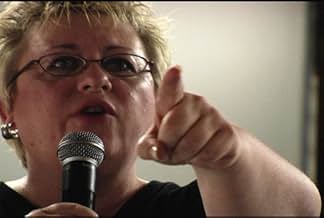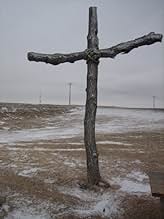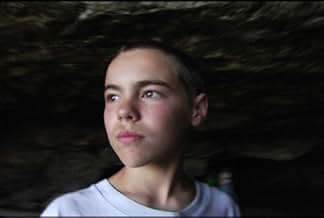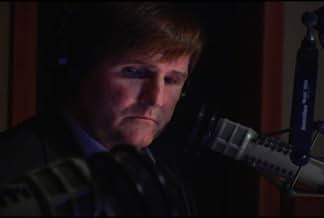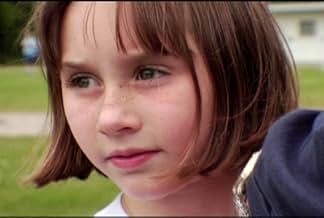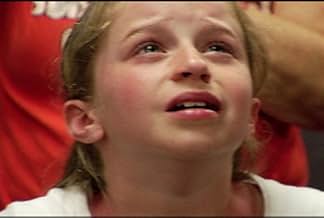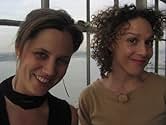IMDb रेटिंग
7.4/10
29 हज़ार
आपकी रेटिंग
अपनी भाषा में प्लॉट जोड़ेंA documentary on kids who attend a summer camp hoping to become the next Billy Graham.A documentary on kids who attend a summer camp hoping to become the next Billy Graham.A documentary on kids who attend a summer camp hoping to become the next Billy Graham.
- 1 ऑस्कर के लिए नामांकित
- 6 जीत और कुल 7 नामांकन
फ़ीचर्ड समीक्षाएं
Enter the world of Jesus Camp, a brilliant documentary that chronicles the life of several people who attend or set up a "Jesus Camp" in (ironicaly) Devils Lake North Dakota.
Filmmakers Heidi Ewing, and Rachel Grady decide to focus mostly on the children that attend, with some focus on minister Becky Fisher who is one of the main architects of the camp.
Right away the filmmakers show a growing underlying change in the evangelical movement, to politicize their beliefs. Voice overs start talking about the newest supreme court nomination of Alito. However, once the focus starts on the kids who attend the camp the film gets its bearing.
What becomes obvious is that paranoia and fear is driven into the kids. There is Ashley a young girl, and Levi an older boy who seems to be on the quest to become a minister and preacher himself. It's obvious he likes the attention that is given him. But the kids are still kids, Levi and his friend go out into the woods and do what all kids do, explore find a scary spider, Levi even mentions, I like to throw rocks.
But then they are back in lessons again, scarred out of their boots in a sermon as they are being told to stay away from Harry Potter, abortion, and that they are essentially dirty from all the sins they carry. Most of them can't hold back the tears. Levi mentions he said he was saved when he was 5 years old (I can only think of the horrible things that he must have been guilty of to be converted (too much sugar cereal maybe?) ) The filmmakers do the smart thing and let the pictures and words speak for themselves. There is no voice over narration, no probing questions from the film-makers to the subjects themselves. There is no debate. The words from the kids just come out, and they are frightening. A sense of brainwashing can only be observed as the kids talk about how they have to fight in gods army, and that everyone else has to be 'purged'. Never mind that at one point kids are worshiping at a card board cut out of George Bush.
Some scenes literally look like they could have came from the movie "Triumph of the Will".
But the brilliance is shown in the innocence that these children loose and don't seem to enjoy in. What young kid needs to know about abortion? or be cleansed of all the horrors of the world? Why can't the kids just make up their own minds with everything but in front of them? When do kids ever get to just.... play? They are hints in the film at that, kids will be kids, little late night camp ghost stories, some break dancing.. it's all in good fun, and perfectly fine.
But it seems like Jesus camp just wants to crush their spirits.
Kudos to the film-makers for showing it real.
Filmmakers Heidi Ewing, and Rachel Grady decide to focus mostly on the children that attend, with some focus on minister Becky Fisher who is one of the main architects of the camp.
Right away the filmmakers show a growing underlying change in the evangelical movement, to politicize their beliefs. Voice overs start talking about the newest supreme court nomination of Alito. However, once the focus starts on the kids who attend the camp the film gets its bearing.
What becomes obvious is that paranoia and fear is driven into the kids. There is Ashley a young girl, and Levi an older boy who seems to be on the quest to become a minister and preacher himself. It's obvious he likes the attention that is given him. But the kids are still kids, Levi and his friend go out into the woods and do what all kids do, explore find a scary spider, Levi even mentions, I like to throw rocks.
But then they are back in lessons again, scarred out of their boots in a sermon as they are being told to stay away from Harry Potter, abortion, and that they are essentially dirty from all the sins they carry. Most of them can't hold back the tears. Levi mentions he said he was saved when he was 5 years old (I can only think of the horrible things that he must have been guilty of to be converted (too much sugar cereal maybe?) ) The filmmakers do the smart thing and let the pictures and words speak for themselves. There is no voice over narration, no probing questions from the film-makers to the subjects themselves. There is no debate. The words from the kids just come out, and they are frightening. A sense of brainwashing can only be observed as the kids talk about how they have to fight in gods army, and that everyone else has to be 'purged'. Never mind that at one point kids are worshiping at a card board cut out of George Bush.
Some scenes literally look like they could have came from the movie "Triumph of the Will".
But the brilliance is shown in the innocence that these children loose and don't seem to enjoy in. What young kid needs to know about abortion? or be cleansed of all the horrors of the world? Why can't the kids just make up their own minds with everything but in front of them? When do kids ever get to just.... play? They are hints in the film at that, kids will be kids, little late night camp ghost stories, some break dancing.. it's all in good fun, and perfectly fine.
But it seems like Jesus camp just wants to crush their spirits.
Kudos to the film-makers for showing it real.
As a man of religion I don't want to be too critical of the Evangelicals in this documentary, but man! It's hard to watch these kids being drilled on adult issues in a very cult-like way and not feel a certain type of way about it. All parents are going to instill some form of beliefs, ethics, morals, or principles into their children, that's part of being a parent. You have to teach them to be good and upstanding before releasing them upon society. And sure, every parent may go about that teaching process in a different way, but watching "Jesus Camp" I couldn't help but be bothered. These kids aren't old enough to even think about sex, yet they're being lectured about abortion. Not once did I hear anything about being truthful, honest, kind, or generous. I just heard, "Love Jesus." "Pray for this, pray for that, and don't sin." "Jesus Camp" is scary and not for the reasons the camp-goers would think.
I saw this film at SilverDocs, a documentary film festival at the American Film Institute in Silver Spring. It's excellent, and I highly recommend it.
The basic storyline follows a year in the lives of three children from evangelical Christian families in Missouri, and focuses considerably on their experience at an evangelical summer camp ("Kids on Fire" in Devil's Lake, ND). The kids, 12-year-old Levi, 10-year-old Tory, and 9-year-old Rachel are, of course, endearing in their cuteness, but frightening in their fervor. Levi thinks that he will become a pastor, and his preaching to kids is starkly reminiscent of the Bible thumpers of Sunday morning TV. At camp, Tory is shown several times with tears streaming down her face, not least when a pro-life leader comes and distributes miniature plastic fetuses to illustrate the evil of abortion and again when many kids at camp begin speaking in tongues. Rachel, a nine-year-old evangelist, walks up to perfect strangers to ask them if they believe they're going to heaven and whether they would like to talk about Jesus. In short, the kids are the perfect spokespeople for the Jesus movement.
The documentary goes beyond their experiences at camp and paints a vivid image of the evangelical subculture in middle America. From scenes with a mother home schooling her son on the lunacy of evolution to kids at camp praying fervently for a cardboard cutout of George W Bush, the tenacious beliefs of the subjects and their utter lack of doubt is striking. The infusion of politics into religion is also notable, as the children are told of the evils of homosexuality, that prayer in school is necessary for schools to teach effectively, and that America is responsible for the deaths of fifty million innocent children since 1973. The families even travel to Washington to protest in front of the Supreme Court building.
The most awkward parts of the movie were scenes with Mike Papantonio, an Air America radio host. I felt the scenes involving him seemed a little forced, although a conversation at the end between the charismatic camp director, Becky Fischer, and Papantonio was an interesting microcosm of the larger political debate in this country. Interestingly, during a film festival question and answer session with the producers (Heidi Ewing and Rachel Grady), they indicated that Papantonio was a late addition to the film because without him, there was no conflict. The people in the film were so sure of their beliefs that nothing in the movie showed them wavering. I wonder if the film might not have been stronger if they had left that sense of certainty alone.
Ewing and Grady also chose to use the nomination of Samuel Alito to the Supreme Court as a thread to tie the film together. Unfortunately, none of the subjects of the documentary spent much time talking directly about the Supreme Court. They talked about some of the issues that the Supreme Court might deal with, but the nomination of judges didn't seem to be a big factor in their lives. There were a few scenes in which radio announcers and guest speakers at the camp encouraged the families to pray for the nomination of judges who agree with evangelical Christians, but I didn't think that there was enough to hold that particular thread together.
During the question and answer session, Ewing and Grady indicated that while they were both fairly secular, big city Democrats, they honestly liked the people in the documentary. In their view, the people in the documentary followed the law, and they worked to make the country better as they saw it, so what's wrong with that? They expressed interest in making a follow-up movie in five years to see whether the kids' faith survives puberty. It would certainly be an interesting experiment. They indicated that Fischer and the families that were profiled had seen the final project and thought that it was a fair representation of their lives. Fischer even thought that she could use it as an evangelical tool! At the same time, the audience I saw it with was overwhelmingly liberal and they also reacted positively (and, I'll say, with a fair degree of shock). To me, that says that Ewing and Grady did a nice job of ensuring that their biases did not show through into the movie, leaving audiences to read into it as they choose.
In sum, Jesus Camp is a movie that is worth watching. If you get a chance, see this film!
The basic storyline follows a year in the lives of three children from evangelical Christian families in Missouri, and focuses considerably on their experience at an evangelical summer camp ("Kids on Fire" in Devil's Lake, ND). The kids, 12-year-old Levi, 10-year-old Tory, and 9-year-old Rachel are, of course, endearing in their cuteness, but frightening in their fervor. Levi thinks that he will become a pastor, and his preaching to kids is starkly reminiscent of the Bible thumpers of Sunday morning TV. At camp, Tory is shown several times with tears streaming down her face, not least when a pro-life leader comes and distributes miniature plastic fetuses to illustrate the evil of abortion and again when many kids at camp begin speaking in tongues. Rachel, a nine-year-old evangelist, walks up to perfect strangers to ask them if they believe they're going to heaven and whether they would like to talk about Jesus. In short, the kids are the perfect spokespeople for the Jesus movement.
The documentary goes beyond their experiences at camp and paints a vivid image of the evangelical subculture in middle America. From scenes with a mother home schooling her son on the lunacy of evolution to kids at camp praying fervently for a cardboard cutout of George W Bush, the tenacious beliefs of the subjects and their utter lack of doubt is striking. The infusion of politics into religion is also notable, as the children are told of the evils of homosexuality, that prayer in school is necessary for schools to teach effectively, and that America is responsible for the deaths of fifty million innocent children since 1973. The families even travel to Washington to protest in front of the Supreme Court building.
The most awkward parts of the movie were scenes with Mike Papantonio, an Air America radio host. I felt the scenes involving him seemed a little forced, although a conversation at the end between the charismatic camp director, Becky Fischer, and Papantonio was an interesting microcosm of the larger political debate in this country. Interestingly, during a film festival question and answer session with the producers (Heidi Ewing and Rachel Grady), they indicated that Papantonio was a late addition to the film because without him, there was no conflict. The people in the film were so sure of their beliefs that nothing in the movie showed them wavering. I wonder if the film might not have been stronger if they had left that sense of certainty alone.
Ewing and Grady also chose to use the nomination of Samuel Alito to the Supreme Court as a thread to tie the film together. Unfortunately, none of the subjects of the documentary spent much time talking directly about the Supreme Court. They talked about some of the issues that the Supreme Court might deal with, but the nomination of judges didn't seem to be a big factor in their lives. There were a few scenes in which radio announcers and guest speakers at the camp encouraged the families to pray for the nomination of judges who agree with evangelical Christians, but I didn't think that there was enough to hold that particular thread together.
During the question and answer session, Ewing and Grady indicated that while they were both fairly secular, big city Democrats, they honestly liked the people in the documentary. In their view, the people in the documentary followed the law, and they worked to make the country better as they saw it, so what's wrong with that? They expressed interest in making a follow-up movie in five years to see whether the kids' faith survives puberty. It would certainly be an interesting experiment. They indicated that Fischer and the families that were profiled had seen the final project and thought that it was a fair representation of their lives. Fischer even thought that she could use it as an evangelical tool! At the same time, the audience I saw it with was overwhelmingly liberal and they also reacted positively (and, I'll say, with a fair degree of shock). To me, that says that Ewing and Grady did a nice job of ensuring that their biases did not show through into the movie, leaving audiences to read into it as they choose.
In sum, Jesus Camp is a movie that is worth watching. If you get a chance, see this film!
This film made my hair stand on end and I came away from it thinking that the adults in it ought to be indicted for child abuse. These children are being intellectually immobilized in the name of goodness and purity. Do they really think they are superior to other young religious zealots who study nothing but their holy book but who are not Christians? It seems that children ought to be exposed to all the wonders of the world instead of being told that their job is to point out the errors of others. Children are highly impressionable and mostly believe what adults tell them. We can only hope that some of these children get some exposure to reality later which will help them live productive and caring lives as people who can accept the world's diversity. The prospects are not good.
8imxo
If there is one thing which "Jesus Camp" reveals, it is the extent to which some adults will rob children of a normal childhood in order to foster their own politico-religious agenda. The children in this film are not being inculcated with moral and spiritual values; they are being manipulated into quasi-religious hysteria. In the name of a warped sense of religiosity the adults in this film are deliberately creating cadres of Christianist "yes men." This isn't faith; it's hypnosis.
I do not doubt the good intentions of parents who indoctrinate their children from an early age with principles of religion; after all, the Catholic Church has encouraged this for centuries, and there are wonderful religious schools of all types which provide a strong moral and ethical education to our children. Giving children a foundation of values is invaluable. However, the religio-political cultism demonstrated in this film is beyond the pale. I can guarantee you that if those parents in the film had been born Muslim rather than Christian they would be at the forefront of such practices as stoning and clitoral circumcision. If that's what their particular Good Book calls for, they are all for it. It sure saves thinking for oneself. At the very least, those who survive this kind of cultist indoctrination may turn out to be psychologically disturbed or emotionally impaired. The children of "Jesus Camp" are the kinds of people who wind up as bigots, informers, and lovers of authoritarianism, and who join the myriad of "holier-than-thou" types who already populate American so-called Christianity. These children may never be able to think for themselves. If they do eventually see through this well-intentioned nonsense, they can wind up as the kind of obnoxious hypocrites which they themselves would be quick to condemn.
What an astounding coincidence, then, that one of those very kinds of people shows up for quite a while towards the end of film. Ted Haggard, Evangelical pastor and newly confessed drug-buyer and patron of "male-massage", is seen counseling a young boy on how to play upon his youth in order to spread the Word. You can already see the young boy fawning over his adult admirers and saying whatever he thinks will please them and bring him a measure of recognition. That's the insidious thing about the "Jesus Camp", the kids really want to please their adult trainers. As for Haggard, in the spirit of Christian love and forgiveness he's already been kicked out of his Church. No turn-the-other-cheek Amish among that bunch. Can't have a guy like Haggard hanging around - especially now that he's been found out. As for the adults who encourage slavish indoctrination of their children, I think they would have been more comfortable in 1930's Spain, Italy, or Germany. Each of those countries had its cadre of young, true believers, too.
I do not doubt the good intentions of parents who indoctrinate their children from an early age with principles of religion; after all, the Catholic Church has encouraged this for centuries, and there are wonderful religious schools of all types which provide a strong moral and ethical education to our children. Giving children a foundation of values is invaluable. However, the religio-political cultism demonstrated in this film is beyond the pale. I can guarantee you that if those parents in the film had been born Muslim rather than Christian they would be at the forefront of such practices as stoning and clitoral circumcision. If that's what their particular Good Book calls for, they are all for it. It sure saves thinking for oneself. At the very least, those who survive this kind of cultist indoctrination may turn out to be psychologically disturbed or emotionally impaired. The children of "Jesus Camp" are the kinds of people who wind up as bigots, informers, and lovers of authoritarianism, and who join the myriad of "holier-than-thou" types who already populate American so-called Christianity. These children may never be able to think for themselves. If they do eventually see through this well-intentioned nonsense, they can wind up as the kind of obnoxious hypocrites which they themselves would be quick to condemn.
What an astounding coincidence, then, that one of those very kinds of people shows up for quite a while towards the end of film. Ted Haggard, Evangelical pastor and newly confessed drug-buyer and patron of "male-massage", is seen counseling a young boy on how to play upon his youth in order to spread the Word. You can already see the young boy fawning over his adult admirers and saying whatever he thinks will please them and bring him a measure of recognition. That's the insidious thing about the "Jesus Camp", the kids really want to please their adult trainers. As for Haggard, in the spirit of Christian love and forgiveness he's already been kicked out of his Church. No turn-the-other-cheek Amish among that bunch. Can't have a guy like Haggard hanging around - especially now that he's been found out. As for the adults who encourage slavish indoctrination of their children, I think they would have been more comfortable in 1930's Spain, Italy, or Germany. Each of those countries had its cadre of young, true believers, too.
क्या आपको पता है
- ट्रिवियाSince the making of the film, Becky Fischer, children's pastor for Kids on Fire, announced that due to negative reactions to the camp after the film, including telephone calls and vandalism, the camp, which was held once a year for three weeks, has been discontinued indefinitely and will be replaced by other events.
- भाव
Rachel: [preaching to a group of guys sitting in a park] If you were to die right now in this moment, where do you think you'd go?
guy in the park: Heaven
Rachel: [subdued] Really?
guy in the park: Yeah. Sure.
Rachel: Oh... okay. Have a nice day!
[runs back to her friends]
Rachel: I think they were Muslims!
- साउंडट्रैकBreathe Prophesy
Music and lyrics by Todd Ganovski
टॉप पसंद
रेटिंग देने के लिए साइन-इन करें और वैयक्तिकृत सुझावों के लिए वॉचलिस्ट करें
- How long is Jesus Camp?Alexa द्वारा संचालित
विवरण
बॉक्स ऑफ़िस
- US और कनाडा में सकल
- $9,02,544
- US और कनाडा में पहले सप्ताह में कुल कमाई
- $17,659
- 17 सित॰ 2006
- दुनिया भर में सकल
- $10,13,596
इस पेज में योगदान दें
किसी बदलाव का सुझाव दें या अनुपलब्ध कॉन्टेंट जोड़ें


